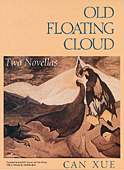Rejecting the real world, she expels all outside forces to write of the internal soul world. "I believe if you want to change the world, you have to change your soul first," Can Xue added enthusiastically. Expressing distaste for contemporary American literature, she added, "What I write dances from my heart. The writer fights with the self, but you can't control yourself to write."
 A Plant of China and the West
A Plant of China and the West
Can Xue blends aspects of Chinese culture with modern Western influences in her works. "My works are like a plant," she explained.
"My ideas grow up in the West but I dig them up to replant in China's deep soil, a rich history of 5,000 years. My works aren't like those from the West or from China, bur rather my own creation. Chinese culture is from my heart. I was born here. I live here. I don't need to learn what is from my heart."
Franz Kafka has been one of Can Xue's major influences in her writing ever since his works were introduced to China in 1983. Can especially enjoys The Castle. His early works, The Metamorphosis, are more immature in her eyes. Can wrote an article in "TheGreat Wall" in her critical collection on Kafka, entitled The Castle of the Soul. She thinks most Chinese critics wrongly claim Kafka writes of realism and anti-capitalism. His stories, in her point of view, are literature of the soul. Can Xue's other key inspiration comes from Borges's works and Dante's The Divine Comedy.
 Writing of the Irrational
Writing of the Irrational
 Rather than focus on the socio-political in her works, Can Xue prefers to write of the irrational, proclaiming "no one else is writing like me in China." She draws the reader into a world of the grotesque and the surreal, of uncertain spaces and indeterminate identities, of sexual menace and psychological disorientation. These novellas are about life in post-Mao China, but not the China of social realism or of Western fantasy. LikeYellow Mud StreetandOld Floating Cloud, her works explore Chinese reality through images of the absurd, sudden, and illogical juxtapositions, and the limitless transformations induced by a unique imagination.
Rather than focus on the socio-political in her works, Can Xue prefers to write of the irrational, proclaiming "no one else is writing like me in China." She draws the reader into a world of the grotesque and the surreal, of uncertain spaces and indeterminate identities, of sexual menace and psychological disorientation. These novellas are about life in post-Mao China, but not the China of social realism or of Western fantasy. LikeYellow Mud StreetandOld Floating Cloud, her works explore Chinese reality through images of the absurd, sudden, and illogical juxtapositions, and the limitless transformations induced by a unique imagination.
Can Xue believes the darkness breeds the light. "Every human is a sinner. We all have the potential for good and evil, darkness and light, for beautiful yet complicated stories. But Chinese culture comes from my heart."
"I don't need to consciously learn what comes from my heart," she claims.
She holds a high opinion of her unique place in Chinese literature, yet she maintains a balanced humility. She does feel some women writers are threatened by her style, though she is friendly with Wang Anyi, possibly the most popular woman writer in China now. Can Xue explained that her friend is popular "because she is safer in her writing, but I disagree with how she promotes traditional Chinese culture. It's not necessarily a good thing to please everyone."
